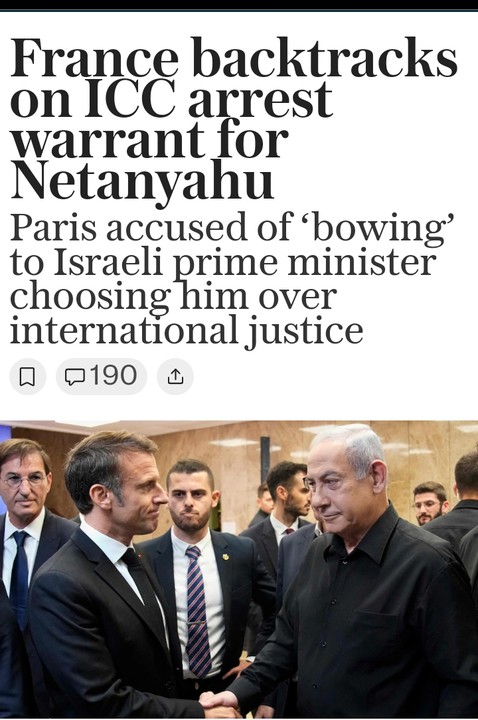France was accused of “bowing” to pressure from Benjamin Netanyahu after it confirmed on Wednesday that the Israeli prime minister was immune from prosecution by the International Criminal Court (ICC).
The ICC last week issued warrants for Mr Netanyahu, Yoav Gallant, the former defence minister, and Mohammed Deif, Hamas military chief, for “crimes against humanity and war crimes committed from at least Oct 8 2023 until at least May 20 2024”.
The move prompted outrage from Israel and its allies – including the US, which is not a member of the ICC and has rejected its jurisdiction.
France has taken a cautious stance on the issue of arrest warrants. Unconfirmed media reports said Mr Netanyahu angrily raised the issue in telephone talks with Emmanuel Macron, the French president, and urged Paris not to enforce the decision.
The French foreign ministry made it plain that it would not arrest him, saying the Israeli leader was covered by immunity rules that apply to states that are not a party to the ICC.
“A state cannot be held to act in a way that is incompatible with its obligations in terms of international law with regards to immunities granted to states, which are not party to the ICC,” the French statement said.
Such immunities apply to prime minister Netanyahu and other ministers in question, and must be taken into consideration should the ICC ask us to arrest them and hand them over,” it said.
Marine Tondelier, the French Green leader, described the foreign ministry’s line as a “disgrace”.
“France is once again bowing to Benjamin Netanyahu’s demands by choosing him over international justice,” she said.
Earlier on Wednesday, Jean-Noel Barrot, the French foreign minister, had already said that France considered that some leaders could enjoy immunity from ICC prosecution.
Asked if France would arrest Mr Netanyahu if he stepped on French territory, Mr Barrot did not give a specific answer in an interview with Franceinfo radio.
He said France “is very committed to international justice and will apply international law based on its obligations to cooperate with the ICC”.
But he added that the court’s statute “deals with questions of immunity for certain leaders”.
“It is ultimately up to the judicial authorities to decide,” he added.
The comments marked the first time a top French official has evoked a possible immunity.
On Tuesday, G7 foreign ministers said they would “comply with our respective obligations” regarding the arrest warrant without going further.
Josep Borrell, the EU’s foreign policy chief, said the arrest warrants were “binding” and should be implemented.
Sir Keir Starmer’s official spokesman said the Government respected the court and refused to rule out that Mr Netanyahu would be arrested if he was to come to the UK, in comments widely interpreted as supportive of the decision.
He said: “We respect the independence of the ICC.”
France has been instrumental in efforts to end fighting in the Middle East and, with the United States, helped broker a ceasefire between Israel and Lebanon that came into force on Wednesday.
Article 27 of the Rome Statute, the foundation of the ICC, states that immunity “shall not bar the Court from exercising its jurisdiction over such a person”.
But article 98 says a state cannot “act inconsistently with its obligations under international law with respect to the… diplomatic immunity of a person”.




